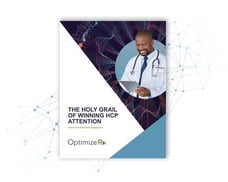When accurate diagnoses and treatments are delayed, patients pay the price—clinically, financially, and emotionally. While it’s not a panacea for all the challenges patients face, this white paper explores how life science marketers can be part of the solution through smarter HCP and DTC marketing strategies.
When accurate diagnoses and treatments are delayed, patients pay the price—clinically, financially, and emotionally. While it’s not a panacea for all the challenges patients face, this white paper explores how life science marketers can be part of the solution through smarter HCP and DTC marketing strategies.

Next-Best Action: A Patient-First Approach to HCP Targeting
AI in Pharma Marketing: The Power of HCP Segmentation and NPI Targeting
The digital landscape has been transformative for the pharma and medtech industries, opening new pathways for reaching healthcare providers (HCPs) and supporting patients more efficiently. So why is it still so challenging to find and onboard brand-eligible patients? Largely because of the volumes of data (and associated processing power) has been difficult to scale.
But advances in AI technology and new, de-identified patient data sources, are unlocking new insight into the patient journey. This enables AI-driven, next-best-action strategies that deliver more personalized and impactful brand touchpoints through dynamic NPI segmentation and targeting – setting new standards for efficacy and precision in healthcare marketing. But what does it mean to be truly patient-first?
Aligning Brand Content with the Patient Journey
In today’s healthcare landscape, understanding the patient journey isn’t just beneficial – it’s essential. When it comes to relevant brand content, it's about ensuring that it resonates at critical windows in the care journey, on physicians’ preferred channels.
In fact, nearly 60% of HCPs in our physician survey agreed that information from life science brands is more valuable when it's directly relevant to the patients they are treating at that moment.

Get your copy of OptimizeRx’s latest white paper, The Holy Grail of Winning HCP Attention: AI-Driven Patient-First Engagement.
The Benefits of AI-Driven NPI Targeting
Drawing on new sources of data, today’s most advanced AI algorithms can identify when a physician should have a specific treatment top-of-mind for a given patients and predict when a patient meets those condition. For example:
- Determining Patient Eligibility: AI can quickly pinpoint when a patient becomes eligible for a brand's treatment, based on their health condition.
- Identifying At-Risk Patients: The technology can flag patients at risk of non-compliance, encouraging proactive engagement from HCPs and continued treatment.
- Recognizing Inflection Points in Therapy: AI helps in identifying when a patient might need a change in therapy or progression, while considering the patient access landscape.
By “activating” physicians when their patients are predicted to meet those conditions, brands can deliver relevant information at an optimal, repeated frequency within the care windows when it is most beneficial. Here’s how this approach to NPI targeting has an impact:
- Physicians receive information that's timely and highly relevant to their current patient care situations, leading to better patient outcomes.
- Patients receive care that's tailored to their individual health journeys, ensuring that treatments and information are relevant and timely.
- Brands see a significant improvement in the effectiveness of their marketing campaigns - messages are no longer lost in the void but reach treating HCPs with precision.
This shift is not just about sending the right message; it's about ensuring that every communication is a step towards better patient care and more effective treatments.
Next-Best-Action Success: Real-World Results
With our Dynamic Audience Activation Platform (DAAP), OptimizeRx is using both de-identified patient data and artificial intelligence to follow these principles of patient-first HCP enagement – and deliver results. Here are two recent success stories:
Case Study One
Faced with the challenges of long-term disease effects on patient quality of life and a lack of ICD-10 code for eligibility, a multinational manufacturer wanted to improve HCP awareness and diagnosis.
Leveraging DAAP’s advanced AI engine and de-identified patient data, the brand experienced:
- 2,683 incremental patients diagnosed
- 13% of nearly 16K exposed providers were new diagnosers
Case Study Two
Similarly, for a global biotechnology company looking to increase awareness among HCPs treating newly diagnosed and relapsing patients with a rare disease, OptimizeRx was able to identify and qualify patients early in the care journey and pinpoint signs of relapse for existing patients quickly.
For this brand, DAAP generated the following results:
- 19% script lift for HCPs found via patient-first targeting
- 16% of exposed HCPs wrote brand scripts during the campaign period
- 9% were new script writers previously unknown to the brand
But it’s not just these two programs that show the transformative impact of patient-first HCP engagement:
Over 11 months, our research on 68 DAAP programs demonstrated a clear trend: campaigns adopting a patient-first approach, combined with multiple channels and consistent messaging, showed a significant increase in script impact.
- Programs that delivered messages through EHR at the precise moment an HCP viewed a patient's chart resulted in a 15% increase in script impact, however...
- Programs using patient-first data combined with dynamic audiences and a multi-tactic, multi-channel approach – including EHR – resulted in a more substantial 28% increase, nearly double the single-tactic, static-targeted programs.
By “activating” physicians when their patients are predicted to meet [eligibility] conditions, brands can deliver relevant information at an optimal, repeated frequency within the care windows when it is most beneficial.
The Turning Point of AI in Pharma Marketing: From Insight to Impact
When deployed on the right AI-driven platform, patient-first approaches are elevating traditional approaches to pharma marketing. But it’s not just about adopting new technologies; it's about using them to deliver customer-centric programs that reflect the dynamic nature of the patient journey and help achieve a higher quality of life for the patients most in need.
Ready to leverage dynamic HCP targeting strategies for better patient outcomes? Read the Full Whitepaper



